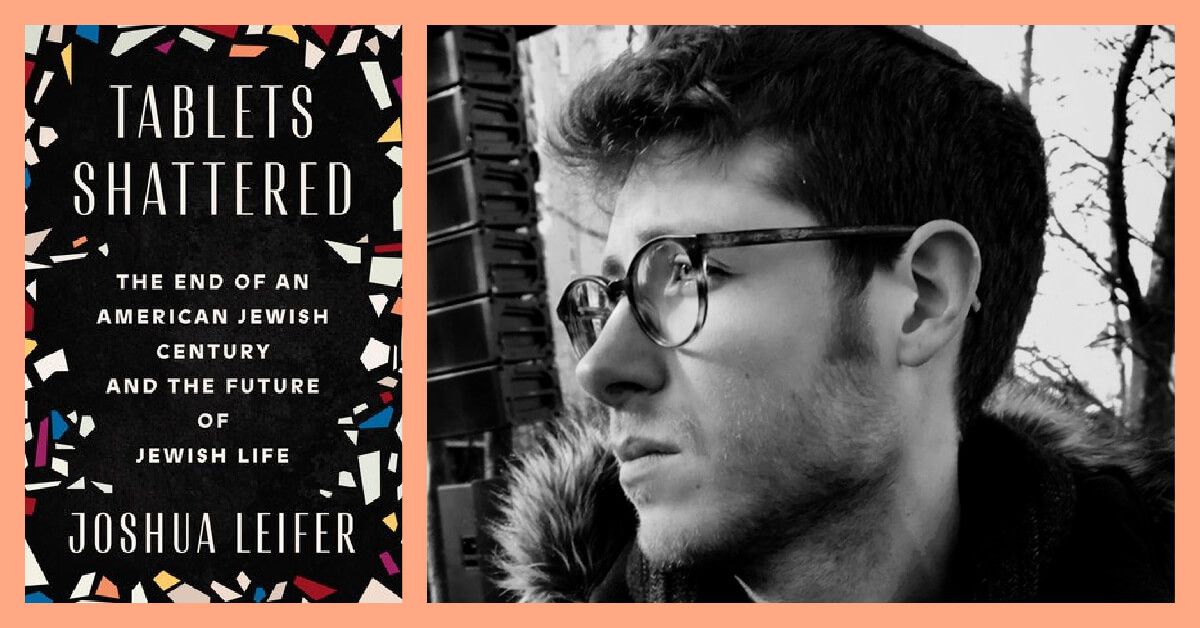A new book about American Jewry is causing controversy. Here’s what it actually says.
A canceled book launch. Surging sales on Amazon. We read ‘Tablets Shattered’ by Joshua Leifer. Here’s the summary.

Joshua Leifer is the author of ‘Tablets Shattered: The End of an American Jewish Century and the Future of Jewish Life.’ Courtesy of Penguin Random House
Journalist Joshua Leifer is used to writing about other people. But for the past week, the news has been about him.
A launch event for his debut book — Tablets Shattered: The End of an American Jewish Century and the Future of Jewish Life — was canceled at the last moment by a bookstore employee who disagreed with the Zionist views of the moderator, a prominent Brooklyn rabbi. A rescheduled event at a new location drew hundreds. The book is now a bestseller in several Jewish categories on Amazon.
Leifer, 30, is taking it all in stride. “If 10 people buy your book on Amazon, it can shoot up the charts,” he told me Tuesday. “I’m trying not to obsess about it too much.”
Besides, Leifer has other things going on. He and his wife, Shaindy, are planning a move this fall to Israel. He will be traveling back and forth to speak about his book and continue working on his Ph.D. in history at Yale, where he is focusing on the transformation of global Jewish politics during the Cold War. (Perhaps a topic for another book?)
So everyone is talking about Tablets Shattered, but what does the book actually say?
Here’s the elevator pitch
The book is Leifer’s attempt to explain how we got to the “fractured American Jewish present” (hence the book’s title). He does yeoman’s work in writing about the explosive growth of Jewish institutions in the 20th century — local federations, synagogues, JCCs, rabbinical seminaries — and how the pillars on which they stand are now collapsing.
Younger generations of Jews — the children and grandchildren of those who built those institutions — are feeling less welcome in those very places. “I experienced this as a young Jewish activist,” Leifer said. At mainstream Jewish organizations, he said, “there wasn’t a place for questions about Israel, and what it was doing. And people weren’t really willing to give answers. If you couldn’t get on board, then you didn’t really have anywhere to go.”
He offers four paths forward
Towards the end of the book, Leifer sees the future unfolding in four possible directions.
The dying establishment: “The huge institutional infrastructure that American Jews built was a huge achievement,” Leifer said. “They’re going to be around for a long time. The challenge is that there isn’t as much buy-in as there was before.” He believes they will “lumber on” but diminished.
Prophetic protest: Young Jews outraged by injustice in the world, especially of injustice caused by Jews, will lash out. “They’ve brought the tallit out of the shul and into the streets,” Leifer explained, adding a caveat: “But what actually is the substance when the protest is over? What does Jewish practice look like beyond the protest?”
Neo-Reform: The rise of a “neo-Reform” movement. “They have taken from the legacy of Reform, the idea that Judaism as a religion can be completely updated to the times as they see it.” But he questions its sustainability because, he argues, “it can’t really give reasons for why it does one thing or the other. There’s a little bit of a pick-and-choose or a live-and-let-live approach to it, and I think that has an impact on its ability to sustain communities.”
Separatist Orthodoxy: The question that often guides Jewish participation is: What does it do for me? But Orthodoxy, Leifer said, “operates along a different axis,” citing its robust mutual aid system and vast communal philanthropy. “The reason why it works,” he said, “is because it’s a community that is, at its core, centered on obligation.”
Why is the book stoking controversy?
Well, the Tablets Shattered launch event was canceled not because of the book itself, but because of the viewpoints of the moderator, Rabbi Andy Bachman. (Bachman wrote about the experience here.)
The book may also be controversial in some circles, as it shines a light on how mainstream Jewish organizations have failed a younger generation. Which might make people aligned with those organizations uncomfortable promoting it.
On the other side of the equation, some young Jewish activists — which included Leifer during his formative years — are unhappy with the part of the book that criticizes what Leifer calls the “dogmatism and simplicity” of the ideological left. “The only position that’s acceptable for a lot of people on the activist left is that Israel should be dismantled.”
He added: “Given the cascade of crises and uncertainty that we’re all living through, I wanted to encourage American Jews to think more seriously and intentionally and, yes, even critically about their Jewish identities and what being Jewish means to them.”
The book took on extra resonance because of the war
Most of the book was written before Hamas attacked Israel on Oct. 7, but Leifer was able to update sections, and write an additional chapter at the end, to include a discussion of the attack and its aftermath — both in Israel and in the U.S.
After Oct. 7, he said, “we have to think a lot more about what it means to be Jewish,” adding that antisemitism is now more “significant and widespread.”
“There’s been a further curdling of public discourse,” he said, “I almost wish that I could’ve dealt with it more in the book.” He paused. “Maybe it will be the sequel.”
The Forward’s editor-in-chief, Jodi Rudoren, will be in conversation with Leifer about the book on Sept. 19 at Watchung Booksellers in Montclair, New Jersey.
















